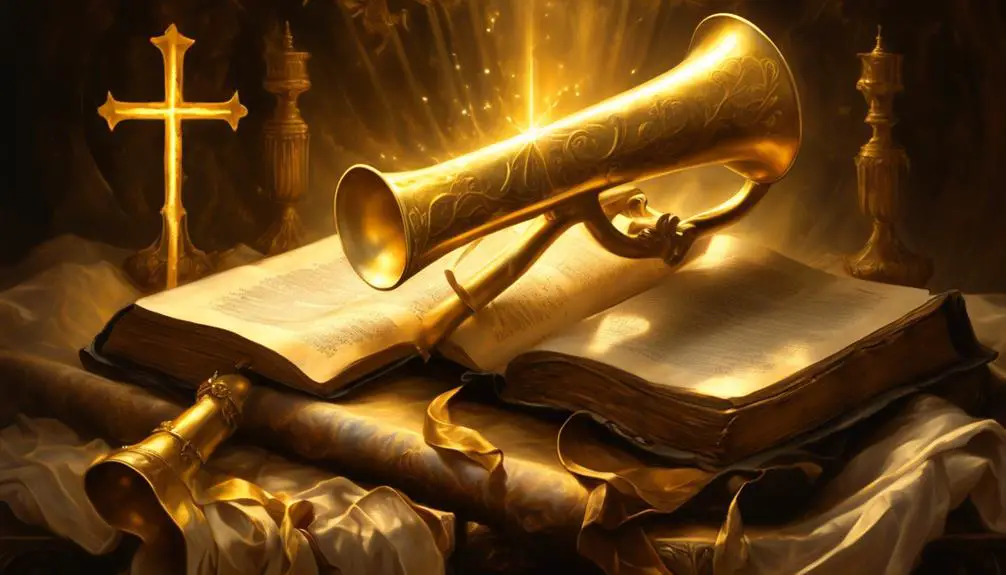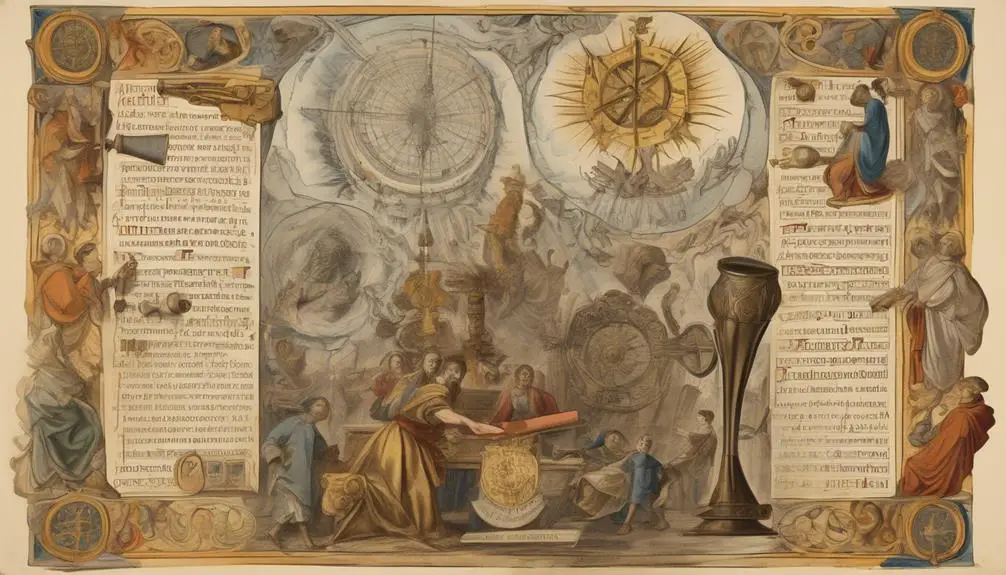Investigate the intriguing biblical concept of 'Clarion Call', a compelling call to action often linked to moral rectitude and spiritual warfare.

Clarion Call Meaning in the Bible
Have you ever questioned the true meaning behind the phrase ‘Clarion Call’ in the Bible? This term, often associated with a loud and clear request for action or moral behavior, originates from the medieval times when a clarion, a type of trumpet, was used to send distinct signals during warfare.
But how does this fit into the biblical context? Could it be a spiritual call to arms or perhaps a divine appeal for moral rectitude? Let’s explore this fascinating concept further, as understanding its significance could potentially shed new light on how you interpret and apply biblical teachings.
Key Takeaways
- The term ‘Clarion Call’ originates from medieval times and refers to a loud and clear trumpet used in warfare and signaling important announcements.
- While the exact phrase is not found in the Bible, the symbolism of the trumpet signifies an alert or call to action, gathering people, signaling a move, or warning of danger.
- In Scripture, ‘Clarion Call’ is interpreted as a divine summons or call to action from God, emphasizing immediate attention, obedience, and repentance.
- ‘Clarion Call’ serves as a moral imperative, urging self-reflection, questioning of actions, and alignment with moral principles, highlighting the ongoing nature of moral obligations.
Historical Origin of ‘Clarion Call

To fully grasp the meaning of ‘clarion call’, it’s crucial to delve into its historical origins. The term ‘clarion call’ has a rich etymology, rooted in the Middle Ages. The word ‘clarion’ was used to describe a type of trumpet that was starkly loud and clear. These trumpets were frequently used in the battlefield or as a means of signaling important announcements within medieval communities.
In the context of medieval symbolism, the ‘clarion call’ wasn’t just a loud trumpet sound but a signal that demanded immediate attention and action. It often signified imminent danger or a call to arms, compelling individuals to act together for a common cause. The sound of the clarion was a symbol of urgency and a call for collective action.
Over time, the term ‘clarion call’ has evolved but has retained its core connotation of a loud and clear call to action. Today, it’s used more metaphorically to describe a powerful request for people to take action on a pressing issue or cause. Whether it’s a call for social justice, environmental action, or political change, the ‘clarion call’ continues to symbolize an unignorable demand for action.
Analyzing the term’s evolution, it’s clear that the ‘clarion call’ has always been associated with urgency, clarity, and a demand for collective action. Understanding its historical origins and medieval symbolism allows you to appreciate the full weight and power of a ‘clarion call’.
Biblical References to ‘Clarion Call

While understanding the medieval roots of ‘clarion call’ enriches our comprehension, it’s also insightful to explore its presence and significance in biblical texts. The term ‘clarion call’ doesn’t appear verbatim in the Bible, but the concept echoes throughout the text, often marked by the symbolism of a trumpet.
The trumpet symbolism in the Bible typically signifies an alert or a call to action, very much akin to the present-day understanding of a ‘clarion call’. The sound of the trumpet was used to gather the people, signal a move, or warn of impending danger. For instance, in Numbers 10:9, the Israelites were instructed to blow trumpets as a sign for God’s attention during war. Similarly, in Exodus 19:16, the blast of a trumpet signified God’s descent onto Mount Sinai, a momentous event indeed.
The prophetic significance of the ‘clarion call’ in biblical context is also intriguing. The trumpet is often associated with prophetic announcements, as in Joel 2:1 where a trumpet is blown in Zion to announce the day of the Lord. Similarly, in the New Testament, the seven trumpets in Revelation herald various divine judgments, effectively serving as a ‘clarion call’ to humanity.
Interpretation of ‘Clarion Call’ in Scripture

In interpreting the ‘clarion call’ in scripture, it’s crucial to delve into the specific situations where this metaphorical trumpet sound is employed. The term isn’t used lightly but rather emphasizes a divine summons or a call to action. Understanding this requires an examination of the biblical contexts it’s used, thereby enabling you to grasp its profound implications.
The ‘clarion call’ typically signifies a divine summons, a powerful call from God that demands attention and obedience. It’s akin to a trumpet’s clear, ringing sound that can’t be ignored. In the Old Testament, for instance, the clarion call is associated with God’s call for Israel’s repentance and return to righteousness. It was a call for radical change, a divine mandate that required immediate action.
Furthermore, prophetic interpretations of the ‘clarion call’ often indicate a spiritual awakening or catalyst for change. The prophets, acting as God’s mouthpieces, relayed these divine summons to the people. When the ‘clarion call’ sounded, it signified an imminent shift in spiritual dynamics. This interpretation is evident in the book of Revelation, where the trumpet calls—often seen as ‘clarion calls’—herald significant events in the End Times.
Clarion Call’ as a Moral Imperative

Shifting our focus from the spiritual dynamics, the concept of ‘Clarion Call’ also carries a significant weight as a moral imperative, instructing us to heed its message and reflect upon our actions. This notion isn’t just an abstract concept but has imperative implications in shaping our moral compass.
In the context of moral obligations, the ‘Clarion Call’ serves as a resounding alarm, urging you to question your actions, to determine whether they align with the moral principles you uphold. It’s a reminder to not become complacent, to continually evaluate and adjust your behavior according to the moral standards you set for yourself.
The call isn’t a prescriptive set of rules telling you what’s right or wrong, but rather an invitation for self-reflection and critical thinking. It encourages you to delve into the depth of your conscience, to question your actions and their impact on others. It’s about recognizing that every decision you make, no matter how insignificant it may seem, carries a moral weight.
The ‘Clarion Call’ is a call to action, a call to personal responsibility. It’s a reminder that moral obligations aren’t just about adhering to societal norms, but about aligning your actions with your personal ethics. It’s about understanding that morality isn’t static, but an ongoing process of self-evaluation and growth.
Modern Usage and Relevance of ‘Clarion Call

Often, you’ll find the term ‘Clarion Call’ used in modern contexts, still holding immense relevance and influence over societal discourse and individual actions. This potent phrase continues to shape perceptions, inspire movements, and provoke thought in contemporary society. The call definition in this context is a strong and clear request for people to take action on a particular issue.
The societal impact of the ‘Clarion Call’ is evident in various spheres. In politics, it serves as a rallying cry, beckoning citizens to mobilize around a cause or a leader. In social activism, it’s the loud and clear demand for change, be it in terms of climate action, racial equality, or any other pressing issue. It’s the resonant voice that disrupts complacency and compels people to act.
In the realm of business, the ‘Clarion Call’ can be an urgent appeal to adapt to changing market dynamics or to uphold ethical practices. In the arts, it could be a potent theme employed to challenge convention and provoke thought.
Despite its ancient roots, the ‘Clarion Call’ remains a powerful tool in modern communication. It’s a metaphorical trumpet that cuts through the noise of daily life, demanding attention and action. Its relevance today underscores the power of language in shaping society, influencing behavior, and driving change.
As long as there are causes to champion and injustices to fight, the ‘Clarion Call’ will continue to echo in our collective consciousness, reminding us of our duty to respond.
Conclusion
In conclusion, you’ve discovered the ‘Clarion Call’ isn’t a direct biblical term, but its principles echo in Scripture. Its historical roots in signaling urgency still resonate today.
Interpreted biblically, it represents a moral imperative to heed God’s directives. Understanding its meaning can influence your approach to faith and life, highlighting the continued relevance of this age-old phrase.
So, listen out for that ‘Clarion Call’, it may just be a pivotal prompt in your spiritual journey.



Sign up